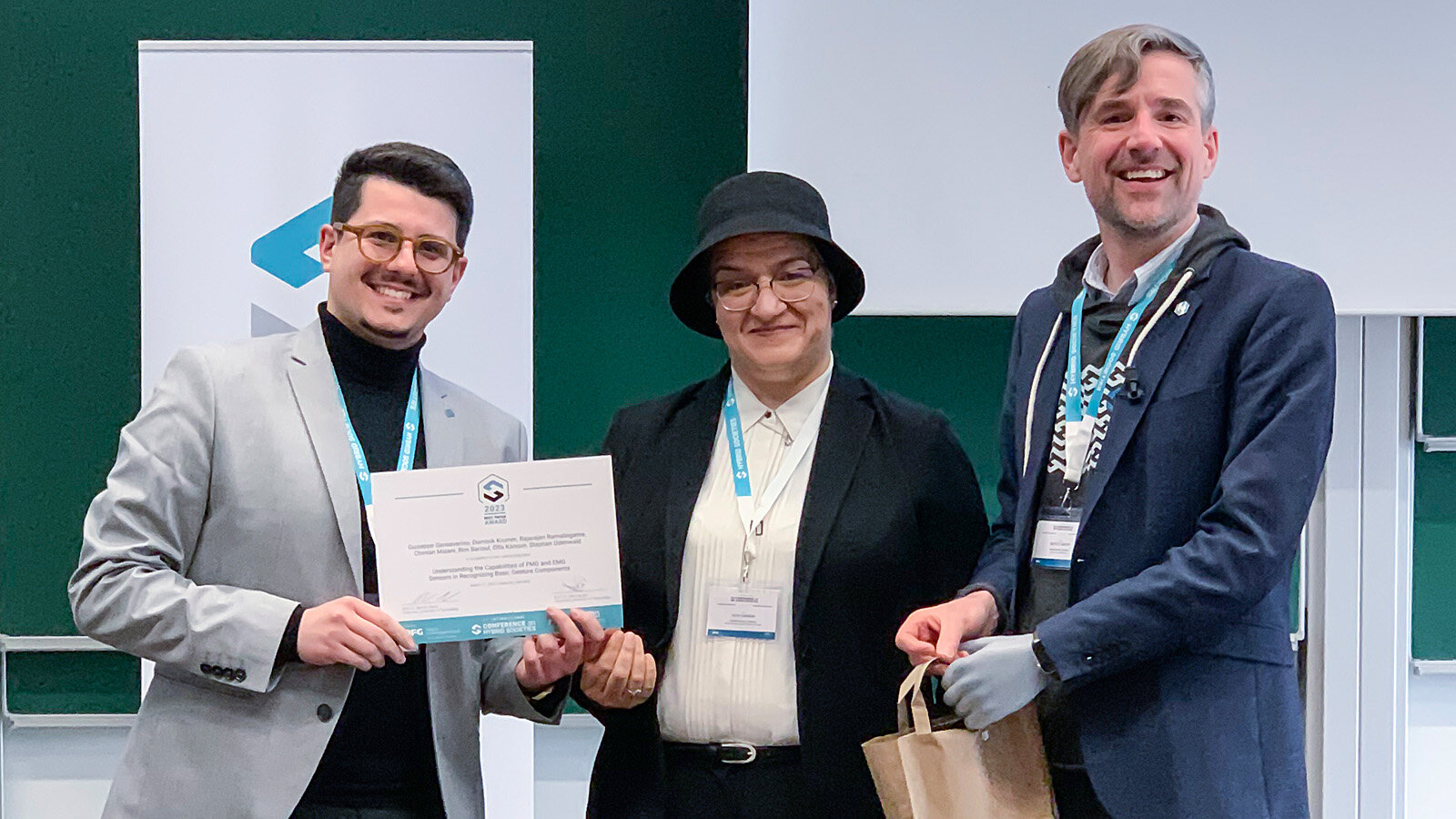Challenges of Human Encounters With Autonomous Technologies in Everyday Life Discussed
Under the leadership of the Collaborative Research Center Hybrid Societies of Chemnitz University of Technology, 130 international researchers discussed specific requirements for human-machine interaction
-

Prof. Dr. Bertolt Meyer (right), spokesperson for the CRC Hybrid Societies, opened the international conference. Prof. Dr. Olfa Kanoun from Chemnitz University of Technology is the co-spokesperson and was part of the jury that presented two Best Paper Awards during the conference. On the CRC side, one award went, among others, to Giuseppe Sanseverino. Photo: Ingmar Rothe/CRC Public Relations -

Around 130 international researchers discussed specific requirements for human-machine interaction at Chemnitz University of Technology. Photo: Nithin-Kashyap Venkatesha
From March 14 to 17, 2023, the first international conference on hybrid societies of the Collaborative Research Center (CRC) Hybrid Societies took place at the Chemnitz University of Technology. The focus of the event in the Central Lecture Hall Building was on the "rules of the game" for interaction between humans and digital, embodied technologies in everyday life.
Prof. Dr. Bertolt Meyer, spokesperson for the CRC and head of the Professorship of Work, Organizational and Economic Psychology at Chemnitz University of Technology, opened the conference: "During this first major and international conference for us, we mainly exchanged ideas on how humans can coordinate smoothly with robots and other autonomous technologies in public spaces," says Meyer. "We were able to integrate two hybrid symposia on autonomous driving into the conference, each with several contributions by colleagues from Japan," Meyer continues. Autonomous driving as a precedent subject of hybrid societies is one of the research foci of the CRC.
"In this context, we were concerned with how technology must be designed to meet the requirements for spontaneous encounters and what social framework conditions we need," says Meyer. The conference not only addressed the essential goals of the CRC but also highly topical issues – especially regarding the organization of responsibility and accountability in interaction with autonomous technologies in public spaces.
Technology Closely Aligned with Human Needs, Expectations, and Abilities
Highlights of the program were the keynotes by Dr. Matthew Johnson (Florida Institute for Human & Machine Cognition), Prof. Tal Oron-Gilad (Ben-Gurion University of the Negev), and Prof. Gustav Markkula (University of Leeds). The three impulses focused on human-machine collaboration and argued from different perspectives for aligning technology design closely with human needs, expectations, and abilities. With the insights offered into current studies, the conference proved to be an ideal platform for communication between basic research and technology development – another essential aspect of the CRC.
High-quality Interdisciplinary program
"A unique feature of the CRC Hybrid Societies is its broad interdisciplinarity – all eight faculties and a total of 18 disciplines are involved," says Prof. Dr. Olfa Kanoun, head of the Professorship of Measurement and Sensor Technology at Chemnitz University of Technology and co-spokesperson of the CRC. "The conference further expanded this interdisciplinarity. We deliberately held all talks in plenary sessions to give all participants the opportunity to attend every contribution," adds Kanoun.
This concept was clearly successful, as seen in the breaks during which lively discussions took place – additionally supported by project posters and robots from the CRC's laboratories presented in the foyer of the Central Lecture Hall Building.
Two Best Paper Awards Presented - Promotion of Young Researchers
As part of the conference, the CRC presented two Best Paper Awards among 43 submissions to promote young researchers. One award went to Giuseppe Sanseverino, Dominik Krumm, Rajarajan Ramalingame, Chintan Malani, Rim Barioul, Olfa Kanoun, and Stephan Odenwald from the CRC for their paper titled "Understanding the Capabilities of FMG and EMG Sensors in Recognizing Basic Gesture Components."
The second award was given to Martin Loidl, Christian Werner, Elisabeth Füssl, Florian Kratchochwil, and Bernd Resch for their submission "A mixed methods approach for capturing interactions of cyclists with mobility space," who are researching at institutions outside the CRC.
The jury responsible for the selection was consisting of Prof. Dr. Alexandra Bendixen, head of the Professorship of Structure and Function of Cognitive Systems, Prof. Dr. Guido Brunnett, head of the Professorship of Computer Graphics and Visualization, Prof. Dr. Wolfgang Einhäuser-Treyer, head of the Professorship of Physics of Cognition, Prof. Dr. Fred Hamker, head of the Professorship of Artificial Intelligence, Prof. Dr. Stephan Odenwald, head of the Professorship of Sports Equipment and Technology, and Prof. Dr. Anja Strobel, head of the Professorship of Personality Psychology and Assessment. All jury members hold their professorships at Chemnitz University of Technology.
Dr. Nadine Rauh, scientific coordinator at the CRC and head of the on-site organization team, was satisfied at the end of the conference: "We have put together a diverse program. The fact that it turned into a well-rounded event not only makes us proud, but also makes us want to do more."
This year, diversity was also ensured by two pre-conference workshops, primarily aimed at young researchers. "The contacts made during the conference are an important enrichment for the further work of the entire research network at Chemnitz University of Technology and set the course for future meetings of this kind – after the conference is before the conference", says Meyer.
(Author: Ingmar Rothe / Translation: Brent Benofsky)
Matthias Fejes
27.03.2023




